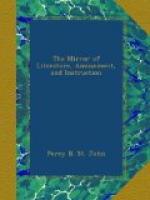[1] “Ancient Wilts,”—Sir
R.C. Hoare, speaking of Stonehenge,
expresses
his opinion that “our earliest inhabitants were
Celts,
who
naturally introduced with them their own buildings
customs,
rites,
and religions ceremonies, and to them I attribute the
erection
of Stonehenge, and the greater part of the sepulchral
memorials
that still continue to render its environs so truly
interesting
to the antiquary and historian.” Abury,
or
Avebury,
is a village amidst the remains of an immense
temple,
which for magnificence and extent is supposed to have
exceeded
the more celebrated fabric of Stonehenge; Some
enthusiastic
inquirers have however, carried their supposition
beyond
probability, and in their zeal have even supposed them
to
be
antediluvian labours! Many of the barrows
in the vicinity
of
Sarum have been opened, and in them several antiquarian
relics
have
been discovered. In short, the whole county is
one of high
antiquarian
interest, and its history has been illustrated with
due
fidelity and research.
[2] Richard of Cirericesler, p. 31, 68, 113.
[3] Cott. Coll. Faustina, b. 3, MSS. Brit Mus.
[4] Brompton Twysd.. 866.
[5] Dodsworth’s History of Salisbury Cathedral.
[6] Roger de Hoveden.
[7] Ibid.
[8] Petrus Blesensis, Epist, 105.
* * * * *
CHRISTMAS CUSTOMS.
(For the Mirror.)
The manner of spending Christmas Eve can hardly be better described than by the celebrated Wilkie’s sketch under that title. Christmas is not now what it was formerly. Wilkie’s painting relates to the present time, and I do not know where Christmas is more cheerfully observed in these days than in London—still there is an alteration—no boar’s head—no pageantries, no wassailing. In the north of England its approach is denoted by the country people having their wood fires, consisting of huge pieces of stumps of trees piled upon the grate, and by entwining branches of holly over their doors, and by school boys acting some play to a school full of auditors; the yearly one at Brough was St. George, which is now put down by some strolling players who exhibit in the town every Christmas.
These are signals for Christmas, and although there is but one Christmas day, yet the week is generally over before any thing like quietness appears. The morning is ushered in by the ringing of the church bells, and the little maidens playing at the game of prickey sockey, as they call it. See them all dressed up in their best, with their wrists adorned with rows of pins, running about from house to house inquiring who will play at the game. The door is opened, and she cries out,




